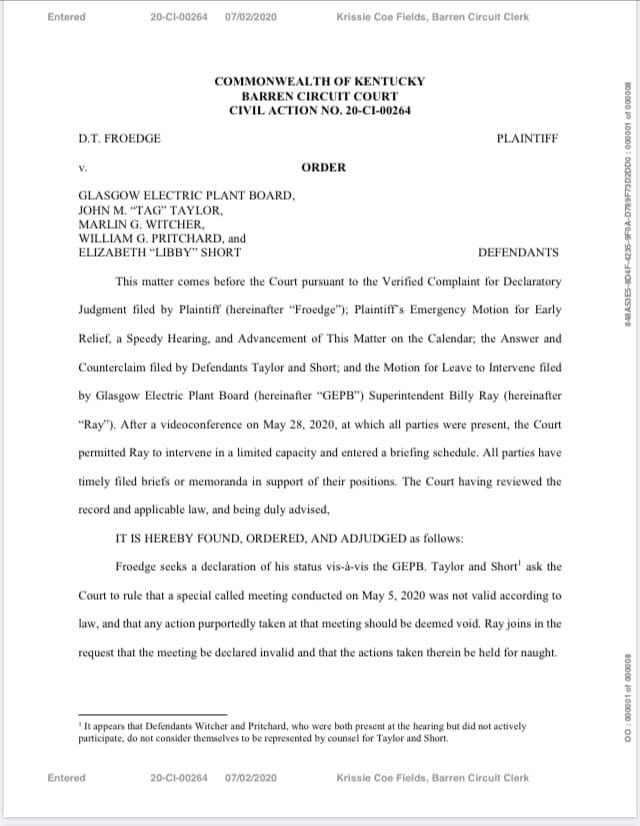
The Barren Circuit Court today ruled that a May 5 "special meeting" of three individuals appointed to the Glasgow Electric Plant Board — which was conducted in the Plant Board drive-thru — violated the Kentucky open meetings law.
Importantly, the court declared that the actions taken at the meeting — including the decision to suspend the superintendent and retain a named search firm to locate a new superintendent — were void.
https://apps.legislature.ky.gov/law/statutes/statute.aspx?id=23055
Why is this significant?
It is because this is one of the first challenges to a public meeting conducted under SB 150, the statutory modification to the open meetings law necessitated by the pandemic.
And it is because the court summarily rejected attempts to defend less than strict compliance with the law.
Judge John T. Alexander began his analysis by questioning the urgency of business that prompted the meeting, astutely noting:
"It is important to realize at the outset that the provisions concerning special meetings, i.e., meetings of a public agency held at a time or place other than the regularly scheduled meetings taking place in the ordinary course of business, recognize that special meetings should be the exception, rather than the rule, when conducting public business.
"The rules are geared towards minimizing surprise and maximizing notice to the public and others interested in the actions of the entity. Taken together these statutory provisions strongly suggest that the business of a public agency should generally be conducted during its regular meetings."
At the center of the dispute was an attempt to circumvent requirements embedded in the Little TVA Act — under which GEPB operates — and the open meetings law.
Specifically, the individuals participating in the "meeting" attempted to make an end run around requirements relating to special meeting calls and adequate notice in order to avoid public oversight and advance personal agendas.
https://www.facebook.com/419650175248377/posts/676503679563024/?d=n
Unlike the open meetings law, which requires a quorum of the agency members to call a special meeting, the Little TVA Act "provides that two (2) members of a board can call a special meeting, and that notice of such meeting shall be sent to all members by the chairperson or the secretary."
In this case, one individual, D.T. Froedge, issued the special meeting call, attaching the names of two other individuals, Witcher and Pritchard, who also purportedly "wished to convene a meeting."
The court found unpersuasive Froedge's argument that, "after he sent the e-mail purporting to call a meeting, Witcher never notified anyone that he did not want a meeting, and neither did Pritchard."
"The statute," Judge Alexander correctly determined, "plainly does not provide for a rebuttable presumption that a member intended to call a meeting unless he or she opts out. Rather, it requires that an affirmative step be taken to call a meeting. Acquiescence through silence does not suffice."
"Froedge" alone, the court concluded, "called the meeting," falling short of the two member statutory requirement.
The court also found the meeting notice deficient as to timing and content.
https://apps.legislature.ky.gov/law/statutes/statute.aspx?id=23047
Although the contested meeting "was not prompted by an emergency," it was "convened during a state of emergency in the Commonwealth and throughout the country, when gatherings of individuals were prohibited or discouraged."
"That fact," Judge Alexander emphasized, "provides more, not less, impetus for the notion that the rules should be strictly construed."
"When a matter such as the present one, which has been festering for years, prompts a board member to request a special meeting, it can hardly be said that notice of twenty-four to thirty hours is as much notice as possible for that special meeting, even if the notice had been statutorily adequate."
The court deftly synthesized the requirements of the open meetings law and SB 150, concluding that the meeting notice was devoid of "specific information on how any member of the public or media organization [could] access the meeting."
"A reference to a videoconference without a link to the videoconference, or directions concerning how to join in the videoconference," the court reasoned, "does not constitute specific information on how a member of the public or representative of a media organization would access the meeting."
In sum, "strict application of the provisions regarding notice of special meetings is required, and there was not compliance with the letter of the law in this instance."
In one of the first major tests of the open meetings law and it's temporary overlay, SB 150, the Barren Circuit Court came through with flying colors.


